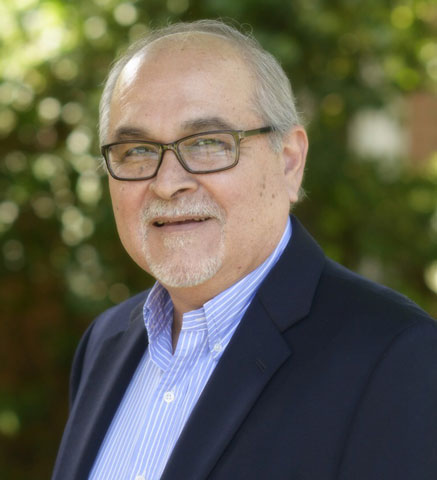
David Saavedra (Courtesy of CTA)
On Nov. 11, just days after the presidential election, Call to Action (CTA) will kick off its national conference, titled "One Earth. One People. Una Tierra. Un Pueblo."
The conference's timing and title seem especially fitting for a country that, throughout the election season, has been fractured by divisive rhetoric surrounding immigration, women, religious affiliation and climate change.
"I think there has been a groundswell of Catholics that recognize that relationships in the church and the world are broken," said David Saavedra, interim co-executive director of CTA. "It is only through the creation of authentic relationships that we are offered the opportunity to dialogue and come to greater understanding of people who have been marginalized."
The conference, which for years was traditionally held in Milwaukee, has become a movable feast recently. The upcoming meeting will take place in Albuquerque, N.M., a location that the CTA committee chose two years ago.
"CTA has made the commitment to move the conference around the country to make it more accessible to more people and especially to other communities with which we hope to expand our connections, such as people of color," said Saavedra.
The effort to increase the accessibility and inclusivity of its meetings was also a significant consideration in CTA's decision, announced over the summer, to shift from hosting an annual national conference to a biennial gathering.
"We felt the need to have regional conferences that would speak more to the needs of the local communities and at the same time provide the opportunity to reach out to communities that would not necessarily have the opportunity to attend the national conference," Saavedra said. "CTA will be able to engage and embrace more people, increase our diversity, and have a greater impact across communities with this new model of alternatively holding regional conferences and national conferences."
These changes to the conference are just two of several transformations CTA has undergone in the past few years. In the spring of 2015, the group's entire board resigned to make way for the creation of a Vision Council, a new model of leadership that would be consistent with CTA's values of transparency, inclusion, antiracism and anti-oppression.
CTA's decision to reform its own structures came as the result of a self-study that recognized the organization needed to make the same demands of accountability for itself that it had been making for the church.
Saavedra admits that this model of "distributive leadership," which allows for the sharing of power at all levels, is a "challenging task for any organization that wants to walk the talk of justice."
The Vision Council's most urgent task is a search for a new executive director, after the departure earlier this year of Jim FitzGerald, who served in the position for nearly six years.
Saavedra said that a search process is underway, with the goal of announcing new leadership by the end of year. This interim phase, he said, has required members of the staff and the Vision Council to step up and assist with the transition. "We have a wealth of talent that has been shared by CTA members and generous donors."
In addition to bringing the conference to a region of the U.S. with strong Latino and Latina populations, another benefit of being in New Mexico is the opportunity to invite Franciscan Fr. Richard Rohr to offer a presentation. One of the most globally recognized teachers in the Christian spiritual tradition today, he is the founder of the Center for Action and Contemplation in Albuquerque.
As NCR reported in 2013, Rohr made the decision to go "off the road," offering talks only in the vicinity of Albuquerque. Rohr was scheduled give the opening keynote Nov. 11, titled "In the Beginning Is the Relationship," a theme that is central to his most recent book The Divine Dance: The Trinity and Your Transformation.
The Nov. 12 keynote will be a plenary panel "Finding Faith: A Young Adult's Journey," which was to consider the relationship between young adults and the church, an urgent concern of conservative, moderate and liberal Catholic communities alike. The discussion was to be moderated by Kaya Oakes, who was also scheduled to offer a separate session based on her 2015 book, The Nones Are Alright.
Interspersed throughout the program on Nov. 12 are four blocks of workshops, many of which focus on topics that remain taboo inside the institutional church, including sessions on sexual ethics, rethinking complementarity, and the transgender experience. Other sessions will consider the experience of Latina spiritual leaders, decolonization, environmental violence, and restorative justice.
Opportunities for prayer and liturgy are also abundant. Early morning prayer sessions will be offered by members of Roman Catholic Womenpriests, the Ecumenical Catholic Communion, Spiritus Christi and FutureChurch. The opening and closing liturgies will seek to honor the Native America spiritualities that are an enduring presence on the 19 pueblos of New Mexico.
The roster's plenary sessions conclude with a keynote address by theologian Greer Gordon. Known for her work in evangelization and catechetics, Gordon was to speak on the need for compassionate collaboration in church leadership.
Saavedra said that amid so much transition, CTA remains committed to better meeting the needs of reform-minded Catholics across the spectrum of age, race, ethnicity, socioeconomic status, and sexual orientation.
"My hope is that we can continue our efforts at the grassroots level to offer the opportunity to build new relationships, hear stories of hope and to be inspired to go back home and help heal relationships in our own lives and communities," he said.
CTA's power to continue its mission in the 21st century, Saavedra said, is grounded in the fact that it is a grassroots movement of devoted Catholic laypeople.
"It is always helpful to keep in mind that true change comes from the people, the sensus fidelium, and not people in power," he said.
[Jamie Manson is NCR books editor.]




